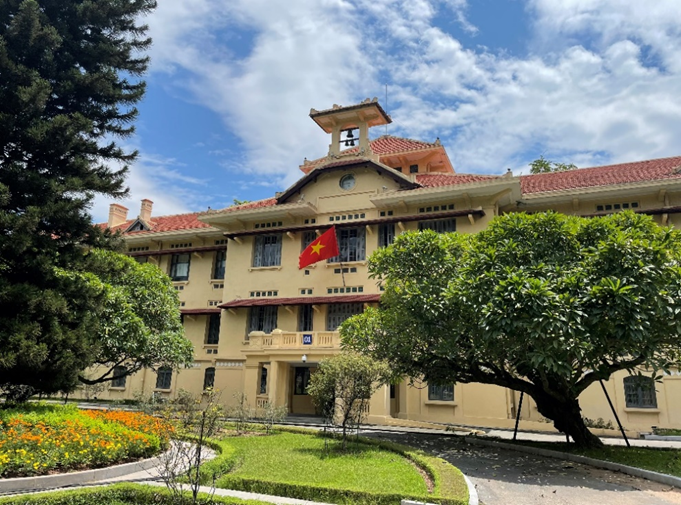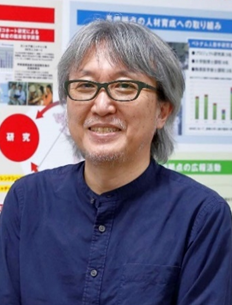Introduction of overseas research bases
Nagasaki University Vietnam Research Station
The Nagasaki University Vietnam Research Station (VRS) aims to make advances in basic and clinical epidemiological research mainly related to dengue fever, zoonotic diseases, diarrhea, and respiratory infections

Part of the Nagasaki University Institute of Tropical Medicine’s Asia-Africa Infectious Disease Research Center, VRS was established in 2006 within the premises of the National Institute of Hygiene and Epidemiology (NIHE) in Hanoi, Vietnam. VRS serves as a research facility that conducts various programs, in order to collect and share with the world knowledge related to infectious diseases. In addition to research, VRS is also used as a place for on-the-job training for young researchers, graduate students, and undergraduate students who aspire to conduct research on tropical medicine and global health in Japan, Vietnam, and the world.
The Nagasaki University Institute of Tropical Medicine (NU-ITM) has also set up a branch office at the Nha Trang Pasteur Institute. In addition, the National Center for Global Health and Medicine is conducting research on drug-resistant bacteria in collaboration with Bach Mai Hospital in Hanoi as a secondary base.
VRS is currently conducting genome analysis/characterization of the causative pathogens of the following target infectious diseases and epidemiological research using clinical information.
Target infectious diseases:
- Mosquito-borne viral infections (dengue fever, Zika fever, Chikungunya fever, Japanese encephalitis, etc.)
- Respiratory viral infections (COVID-19, influenza, respiratory syncytial virus infection, etc.)
- Enteric viral infections (norovirus, rotavirus, enterovirus, etc.)
- Zoonotic viral infections (Nipah virus, Hantavirus, rabies, etc.)
- Diarrhea-causing bacteria (Vibrio bacteria, pathogenic E. coli, etc.)
Retained samples:
- Human serum samples (patients with fever, people who have come into contact with wild animals, etc.)
- Human nasal swab samples (respiratory infection patients)
- Human stool samples (diarrhea patients)
- Animal serum samples (bats, rats, etc.)
- Animal organ samples (bats, rats, etc.)
- Animal stool samples (pigs, poultry, cattle, etc.)
- Environmental samples (river water, sewage, etc.)
Major papers and achievements
- Hoa-Tran et al. Evolution of DS-1-like G8P[8] rotavirus A strains from Vietnamese children with acute gastroenteritis (2014-21): Adaptation and loss of animal rotavirus-derived genes during human-to-human spread. Virus Evol. 2024;10(1):veae045
- Fraenkel et al. The development of new primer sets for the amplification and sequencing of the envelope gene of all Dengue virus serotypes. Microorganisms. 2024;12(6):1092.
- Nguyen et al. Pre-existing cross-reactive neutralizing activity against SARS-CoV-2 and seasonal coronaviruses prior to the COVID-19 pandemic (2014-2019) with limited immunity against recently emerging SARS-CoV-2 variants, Vietnam. Int J Infect Dis. 2024;139:109-117.
- Nabeshima et al. An outbreak of a novel lineage of dengue virus 2 in Vietnam in 2022. J Med Virol. 2023;95(11):e29255.
- Nguyen et al. Serological and molecular epidemiology of Chikungunya virus infection in Vietnam, 2017-2019. Viruses. 2023;15(10):2065.
- Iguchi et al. Genomic characterization of endemic diarrheagenic Escherichia coli and Escherichia albertii from infants with diarrhea in Vietnam. PLoS Negl Trop Dis. 2023;17(4):e0011259.
- Takemura et al. The 2017 Dengue virus 1 outbreak in northern Vietnam was caused by a locally circulating virus group. Trop Med Health. 2022;50(1):3.

A word from Chief Representative
The first joint research project between NU-ITM and NIHE was carried out in 1985. Since then, NU-ITM has worked together with NIHE for 40 years. In 2006, a research station was established at NIHE, and NU-IMT and NIHE have been continuing joint research in the field of tropical medicine in Vietnam.
VRS is equipped with advanced analytical instruments, including next-generation sequencers, and NIHE has BSL3 laboratories that were established with a grant aid project from Japan. As a result of our partnership, NIHE provides support in sample collection and analysis, making VRS an ideal environment for infectious disease research.
In recent years, VRS has been used in a number of projects supported by the Ministry of Education, Culture, Sports, Science and Technology’s Joint Usage / Research Center project on Tropical Diseases, and the Japan Agency for Medical Research and Development (AMED) program, Global Research Infrastructure, Collaborative Research via Overseas Research Centers, and it is becoming an increasingly important research hub. If you are interested in conducting research using VRS, please contact us.

Research Director or Center Director: Futoshi Hasebe
Position: Professor, Institute of Tropical Medicine, Nagasaki University
Degree: Master of Veterinary Medicine, Doctor of Philosophy in Medical Science (Nagasaki University Graduate School of Medical Sciences)
Biography
| Born in Yamagata Prefecture. After completing his Master's in Veterinary Medicine at Azabu University Graduate School, he moved to the Republic of Zambia in 1986, where he worked as a research associate at the University of Zambia's School of Veterinary Medicine while conducting research on zoonotic diseases such as Rift Valley fever and bovine brucellosis. He has worked at the Nagasaki University Institute of Tropical Medicine since 1993. Since 2007, he has been conducting molecular epidemiological surveys of mosquito-borne viruses and emerging bat-borne infectious diseases in Vietnam. |
